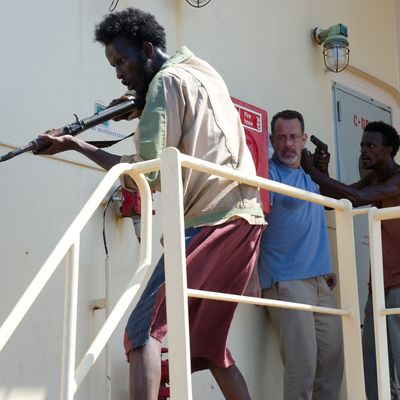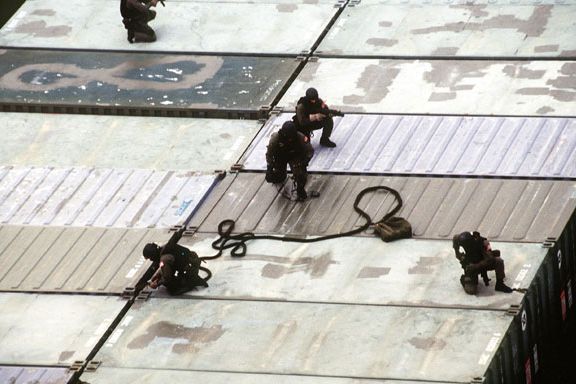
Life has gotten a lot harder for Somali pirates since they kidnapped Captain Richard Phillips in 2009. Back then, Phillips’s vessel, the 14,000-ton Maersk Alabama, had a crew of twenty, but not a single gun onboard. Despite some courageous resistance by the crew, four Somali teenagers armed with nothing but AK-47s and a long ladder were able to board the ship and take Phillips captive. As everyone knows (and as depicted in Tom Hanks’s new movie, Captain Phillips), the captain ended up spending days in a lifeboat with the pirates until a team of Navy SEAL snipers killed his captors in a high-risk operation approved by the president.
Fast forward to today, and it’s hard to imagine those same pirates getting anywhere close to a ship like the Alabama. Since Phillips’s capture, there’s been a sea change (sorry) in how ships defend themselves against piratical assaults. Instead of relying solely on water cannons and evasive maneuvers, companies have taken to hiring private armed escorts of former Marines and Navy SEALs.
“Phillips taught Americans that there were Somali pirates out there and that Americans were just as much targets as anyone else,” says Michael Frodl of C-Level Maritime Risks, a consulting company. “It led to a rethinking of our strategy from response to preemption.”
Now, when a Somali skiff starts speeding toward an armed merchant ship, the guards shoot off flares and warning shots. If it continues to approach aggressively, the guards may shoot out the engine, or even aim directly at the people onboard. Still, most companies try to avoid using force. The Arlington, Virginia–based security company Nexus Consulting prides itself on having deterred eight attacks and over 30 probes “without firing a shot.”

Despite worries that having gun-toting contractors onboard may cause confrontations to escalate, they seem to have worked as a deterrent. Since 2011, the number of pirate attacks around Somalia has plummeted, from 237 that year to just 10 so far this year, according to the International Maritime Bureau. And the number of vessels held by pirates has dropped from 47 in 2010 to only 1 today.
“The last 12 months have seen a remarkable decline in the fortunes of the Somali pirates operating in the Gulf of Aden and the Indian Ocean,” says Rear Admiral Bob Tarrant, operation commander of the E.U. naval force in Somalia, in a recent report.
Part of this has to do with better international coordination between the navies of NATO, Russia, China, and the EU, which have worked to eradicate the large motherships that provide pirate skiffs with fuel and supplies. It also has to do with more stringent enforcement of anti-piracy laws. Somali pirates have been prosecuted from Tanzania to the United States, and more than 1,100 have been jailed.
But there’s no denying that private security has been a big help.
That does not mean that armed guards are free from controversy, however. Last year, a leaked video showed contractors with the Virginia-based Trident group firing dozens of rounds into a skiff with seemingly little warning. Critics fear that without appropriate safeguards, it’s only a matter of time before we see a Blackwater-type incident at sea.
Security teams are typically composed of four men armed with M4 rifles and sniper rifles. Many have backgrounds in law enforcement, Delta Force, or the Navy SEALs. At $50,000 per four-man team, they aren’t cheap, but they do cost less than a multimillion-dollar ransom. So far, business has been good. Last year, Nexus took in more than $10 million in revenue, and escorted 50 ships a month, up from 5 ships per month in 2009.
Now experts’ greatest fear is that complacency will set in. Somali pirates haven’t disappeared, and if merchant ships cut back on their security precautions too soon, they may face the risk of becoming another Alabama, caught vulnerable at sea.
“The successes seen in the past year are reversible,” says Rear Admiral Tarrant. “Piracy still remains an attractive option for young Somali men, despite the risk of capture and prosecution, or death in stormy seas, because the alternative options are few. Moreover, pirate leaders have made significant cash gains from their criminal activities over the last few years.”
More likely though, the next threat will be different than the last. Already, the coast of West Africa — a route taken by European supertankers too large to pass through the Suez Canal — is shaping up to be the next big battlefield. Just this month, the South African navy began training missions in the waters off Nigeria, hoping to get ahead of the problem this time.





























